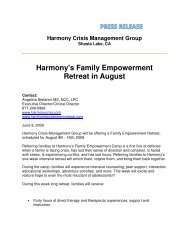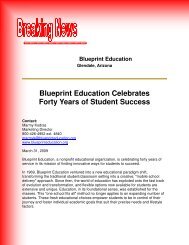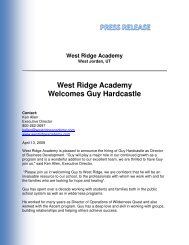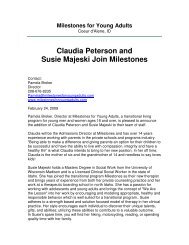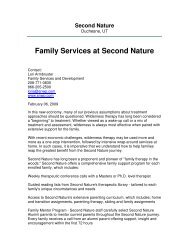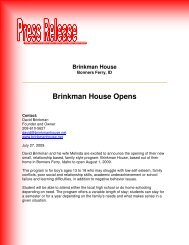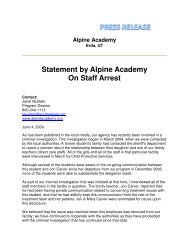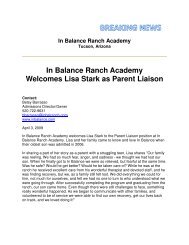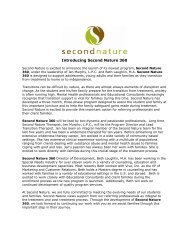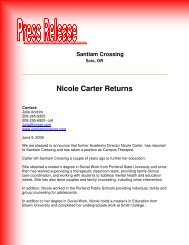TELOS YOUTH OUTPOSTS, INC. - Troubled Teen Help
TELOS YOUTH OUTPOSTS, INC. - Troubled Teen Help
TELOS YOUTH OUTPOSTS, INC. - Troubled Teen Help
You also want an ePaper? Increase the reach of your titles
YUMPU automatically turns print PDFs into web optimized ePapers that Google loves.
<strong>TELOS</strong> <strong>YOUTH</strong> <strong>OUTPOSTS</strong>, <strong>INC</strong>.<br />
P.O. Box 958, El Dorado, CA 95623<br />
Ph. 530-626-0345 Fax: 530-642-8814<br />
E-mail: johndhiatt@telosyouth.com<br />
Website: www.telosyouth.com<br />
Board of Directors<br />
Frank J. Jager Paul Laudenschlager Teresa Russell<br />
Tom Emigh Terry Bixler<br />
_____________________________________________________<br />
February 7, 2009<br />
Press Release<br />
Re: Why Telos Youth Outposts, Inc. is Closing<br />
Telos is closing its doors after 23 years of service to California’s most vulnerable<br />
and disadvantaged boys. At the time, it was a financially and programmically<br />
viable business. The need for its closing was due entirely to the California<br />
Department of Social Services (CDSS), Community Care Licensing Division’s<br />
(CCLD) insistence upon re-interpreting existing regulations to socially reengineer<br />
the operation of children’s’ homes in accordance with some of its<br />
personnel’s personal belief systems, rather than in accordance with the needs of<br />
the children placed into such homes, or even in accordance with other of its own<br />
regulations.<br />
The outcome was that CDSS/CCLD eviscerated our program by finding a<br />
plethora of “new” children’s rights in existing regulations, new rights that<br />
destroyed Telos’ ability to intervene in the inappropriate behavior of its<br />
behaviorally disordered clientele, and instead required Telos staff to become<br />
enablers of that inappropriate behavior. Its action was akin to disallowing<br />
hospitals to perform surgery due to it being too invasive a procedure!<br />
Telos was a very successful program, one that helped many young men turn<br />
away from poor behavioral choices such as crime, drug use, gang involvements,<br />
school failure, etc. Its success was due to its ability to intervene—to get between<br />
a boy and his poor choices—and stop poor behavior, establish a mentoring<br />
relationship with the boy through wilderness pursuits, sports participation, and<br />
the daily milieu, and then gradually lead the boy to choose a healthier lifestyle,<br />
one that became habituated by the time the boy was ready to graduate.<br />
But to intervene in poor behavior required Telos to have certain control over a<br />
boy’s life. Not cruel or abusive control, but rather the abilities to control his<br />
contacts by phone and in person, to search him (not to the extent of strip<br />
searches as are routinely done in government run institutions like juvenile halls,<br />
county ranches, and the California Department of Juvenile Corrections), to<br />
search his property, and to discipline him with slight physical exertions like laps
and push-ups (that are routinely utilized by coaches in government run schools<br />
for the same type of discipline.) But suddenly, the CDSS/CCLD discovered that<br />
their existing regulations freed children in licensed children’s homes from all<br />
these controls and interventions.<br />
Actually, the CDSS/CCLD, in its discussion with this writer, blamed the need for<br />
the changes upon political pressure exerted by the San Francisco Youth Law<br />
Center, and the CDSS Foster Care Ombudsmen’s office. However, when a local<br />
reporter sought to understand CCLD’s side of the issue for a story in Placerville’s<br />
Mountain Democrat, in an astonishing show of government transparency, he was<br />
stone-walled with a repetition of its boiler-plate public statement and a refusal to<br />
allow questioning of the regulators that had actually ordered Telos to make the<br />
changes stated above.<br />
While it may seem that Telos’ closing was sudden and capricious, in actuality this<br />
writer had seen Telos’ destruction coming the past 18 months. You may find the<br />
story interesting.<br />
In the fall of 2007, this writer attended a conference in Van Nuys, CA provided<br />
co-jointly by the California Association of Child and Family Services (of which<br />
Telos was a member) and CCLD. Both the CDSS Foster Care Ombudsman and<br />
CCLD legal division chief addressed those in attendance on the “personal rights”<br />
changes that they were anticipating. They ostensibly were on an “information<br />
gathering mission,” but in retrospect, they were only trying to gauge the level of<br />
the placement community’s opposition to the changes they had already made up<br />
their mind to augment. This writer spoke in defense of current practices to the<br />
extent that he was twice given a standing ovation by his peers, and to the extent<br />
that the presenters refused to call on him again for comment during the session.<br />
Chillingly, afterwards, Telos began receiving heightened enforcement attention<br />
from CCLD, and nuisance citations.<br />
Then in the fall of 2008, this writer was invited by a phone call from its regulator<br />
to a CCLD meeting for providers on the issue of new personal rights for children<br />
in state licensed homes. Due to a required court attendance for a client, this<br />
writer was unable to attend, but did leave a message for the caller stating that<br />
Telos would not accept changes that required its staff to become enablers of<br />
poor behavior rather than interveners to stop it. More CCLD enforcement<br />
attention followed, with more nuisance citations.<br />
Interestingly, in appealing some of these citations, this writer learned that there is<br />
no mechanism to appeal a CCLD citation to an Administrative Law Judge (ALJ).<br />
In California, ALJ’s oversee regulatory matters as opposed to other legal issues.<br />
Rather, there are four levels of appeal, all within CCLD itself. Astoundingly, this<br />
means that CCLD can interpret the regulations under which it operates any way<br />
that it wants, and there is no process for those affected to get the matter in front<br />
of an ALJ for review! In short, private companies such as Telos—a 501 (c) (3)
charitable, non-profit corporation—operating a state licensed facility exist only<br />
upon the benevolence of CCL; they can be shut at any moment CCLD<br />
capriciously chooses with no recourse or appeal outside CCLD. Frankly, I pale<br />
that government of the people, by the people, for the people has given an agency<br />
such as CCLD such power!<br />
In November 2008, Telos received a letter stating that CCLD had undertaken a<br />
routine periodic review of each state licensed children’s home program statement<br />
and questioned certain items that Telos’ program statement had contained for<br />
the past 15+ years. A program statement is like a contract with the state; Telos<br />
spells out its program, and is then obligated to follow that program. In its 23 years<br />
of operation, Telos was never aware of any other routine periodic program<br />
statement review, but that’s an aside.<br />
In response to CCLD’s letter, this writer sought to show that Telos was operating<br />
within the regulations by citing the specific regulations that applied to its conduct<br />
of its program on each issue raised.<br />
The result was more enforcement action. Ostensibly, this time the regulator<br />
showed up on a “follow-up” to an ongoing investigation. In tow, she had a<br />
member of the CCLD legal department, ostensibly a new employee who was<br />
“just observing a day in the life of a regulator.” Together, they just happened to<br />
be in the house when the children arrived home from school and just happened<br />
to stand where they could observe staff search the boys and their school book<br />
packs as is the daily routine. To this writer, the duplicitous purpose of their<br />
presence was obvious.<br />
Telos routinely searches boys after they are away from the facility at school, or<br />
other absences not supervised by staff. Such searches keep weapons, tobacco,<br />
drugs, alcohol, stolen items, and other contraband from entering our home and<br />
thus assist in Telos maintaining a safe, healthy, comfortable environment for all,<br />
as is required by the regulations. The searches are pretty benign and are<br />
routinely accepted by our residents; many have been subjected to strip searches<br />
by government agencies, and probably find the maintenance of their privacy in<br />
our searches refreshing.<br />
Notably, one of the nuisance citations Telos recently received was for an<br />
instance of not providing a safe, healthy, comfortable environment for all.<br />
Then on January 20, 2009 this writer was called to a meeting with CCLD<br />
regulators; only the regulators and he were present. At the outset of the meeting<br />
the written reply Telos had made to CCLD’s November letter was dismissed with<br />
the statement “From the tone of your letter it appears that you are not going to<br />
comply…” Without making any statement regarding the validity of the references<br />
made to existing regulations in Telos’ written response, the regulators then<br />
began stating how Telos was to change its program to comply with the new
personal rights that had been found in its regulations. At one point, this writer<br />
stated that the changes were “stupid,” promised to shutter Telos, and left the<br />
room. It was clear that Telos could no longer intervene to stop the poor<br />
behavioral choices of its behaviorally disordered clientele. Its service as a<br />
behavioral change agent was over.<br />
At this time, California—and our nation and the world—are in the worst economic<br />
crisis since the Great Depression. Employment is scarce and worsening, tax<br />
revenues are low, and the need for services to children is heightened. Despite<br />
all that, in the midst, CCLD has sought to embark on a social re-engineering<br />
project that will eviscerate the programs of the children’s homes that serve<br />
youthful offenders. In our case, our community and its businesses lost a $575K<br />
budget, the state and federal government lost the payroll tax revenues of $350K,<br />
the county lost its portion of the state sales tax generated by the velocity of that<br />
$575K budget through its community, 12 more people were added to the<br />
unemployment rolls, and eight children who were stable and doing well at their<br />
schools and in their programs have suffered a terrible loss—the loss of a<br />
program that they loved! (The note they gave this writer that reflected their pain<br />
is posted on Telos’ website: www,telosyouth.com.)<br />
Why didn’t the CCLD stand up against the Youth Law Center, the CDSS<br />
Ombudsman, and it own legal department to fight for the right of effective<br />
programs like Telos to continue doing what they had long been successful<br />
doing? CCLD has to know what damage their new found rights are causing<br />
behaviorally disordered children in care! What about the rights of these children<br />
to be properly parented, provided loving discipline, and to learn to live<br />
appropriately within our society? Why aren’t those rights important? Why is it<br />
that private business such as Telos is treated like the enemy of the state and<br />
made to kowtow like chattel to the personal whims and prejudices of the people<br />
who populate state agencies such as CCLD? Unfortunately, there will be no<br />
answers to such questions because CCLD does not operate transparently, and<br />
there is no mechanism with which to hold CCLD accountable.<br />
In our 23 years, Telos served 408 boys ages 11-18. It provided 7,902 days of<br />
residential care, supervision and treatment. It engaged in 296 wilderness<br />
adventures (and we might add safely—never did a child require other than 1 st<br />
Aid, stitches, or treatment for a sprain.) Participants camped 554 nights, climbed<br />
170 peaks including Mt. Shasta and Mt. Whitney, rappelled 163 cliffs, and hiked<br />
and paddled 3,226 wilderness miles. Once Telos participated for several days in<br />
the search for a lost young hunter in Trinity County—unfortunately he was found<br />
dead from exposure weeks after the search ended, but we tried!<br />
Over the years, a plethora of staff Telos employed and trained have gone on to<br />
public service in law enforcement, corrections, child protective services,<br />
probation, special education, fire and paramedic services, etc. In short, we
kindled, or at least furthered, the desire of many of our employees to pursue<br />
public service careers.<br />
In 1975, Telos was the dream of this writer, then serving as a high adventure Boy<br />
Scout leader and a Deputy Sheriff. Its foundation was the subject of this writer’s<br />
1986 Master’s thesis entitled A Community Based Wilderness Treatment<br />
Program for Juvenile Offenders. Telos was founded in 1986 and first opened its<br />
doors in 1987. It was successful in carrying out its mission beyond this writer’s<br />
early imagination.<br />
I am thankful for the 23 years that I was allowed to serve the children with the<br />
worst broken hearts. We make a positive mark on the future only in so far as we<br />
make a positive mark on our children. I am thankful that I had the opportunity to<br />
make that mark!<br />
I am also thankful to the local community that accepted Telos, especially the El<br />
Dorado Jr. Cougar Football and Cheer community who embraced our boys, and<br />
the El Dorado County Office of Education’s Charter Community School that<br />
disciplined our children while continuing to provide them with an education, rather<br />
than excluding them from their education for disciplinary reasons. Public schools<br />
could certainly improve educational outcomes by following their example.<br />
I’d also like to acknowledge the fact that it took great teamwork between juvenile<br />
court judges, probation and social welfare department representatives, the<br />
Charter Community School, and Telos itself to arrive at successful outcomes for<br />
children placed into our care. Looking back, a child where that teamwork<br />
faltered—a member of the team did not work effectively with others, or lost<br />
patience—did not have a good outcome. Those children that did benefit from all<br />
members of the team working together—understandingly, effectively, and<br />
patiently—did arrive at good outcomes. I have never heard such teamwork<br />
mentioned as a reason for good outcomes, so here’s another.<br />
While I am saddened at the loss of Telos, and the detrimental effect its closing<br />
has on its residents and staff, and to the future children who will not have the<br />
opportunity, I remain cognizant that—as our boys recently found inscribed inside<br />
a relic of a business in the ghost town of Bodie on a recent wilderness trip—<br />
“nothing endures except change.”<br />
John D. Hiatt, M.A.<br />
Executive Director<br />
Telos Youth Outposts, Inc.<br />
POB 958<br />
El Dorado, CA 95623<br />
(530)-626-0345



